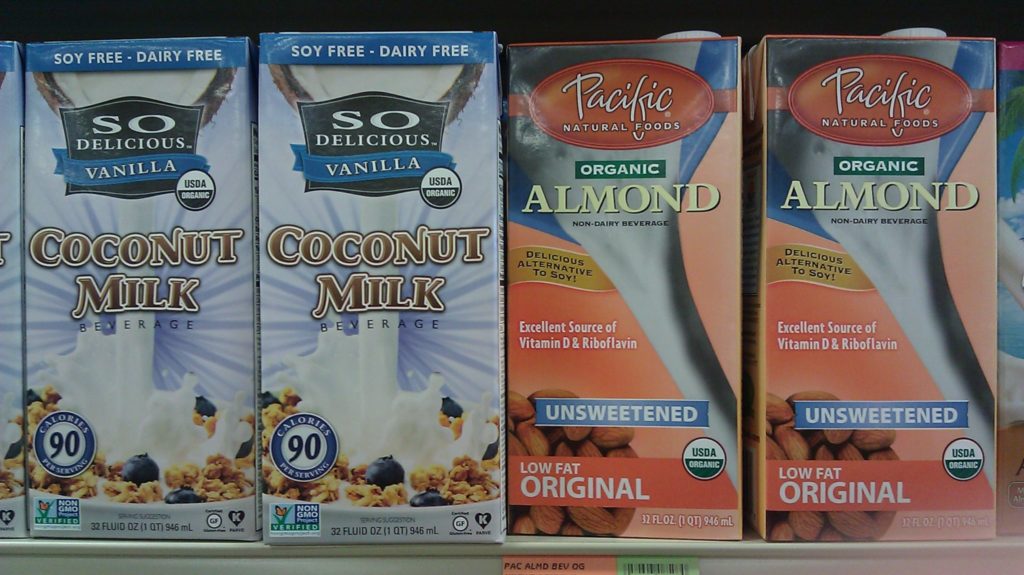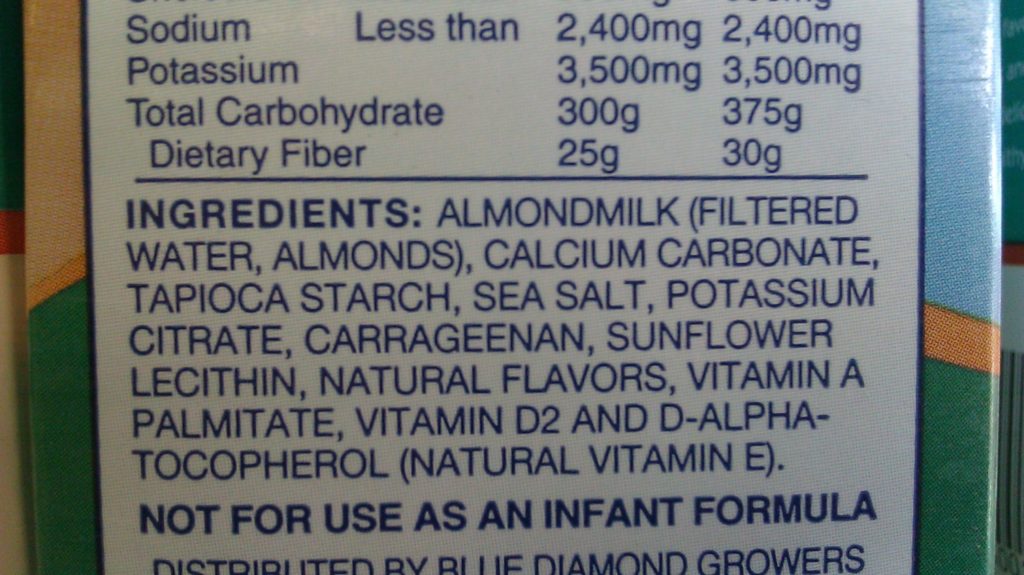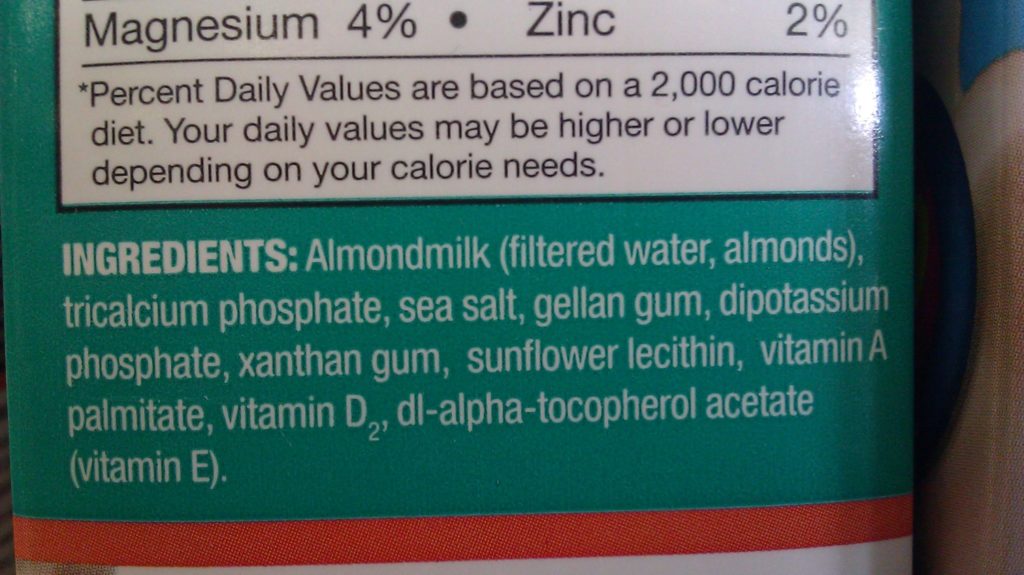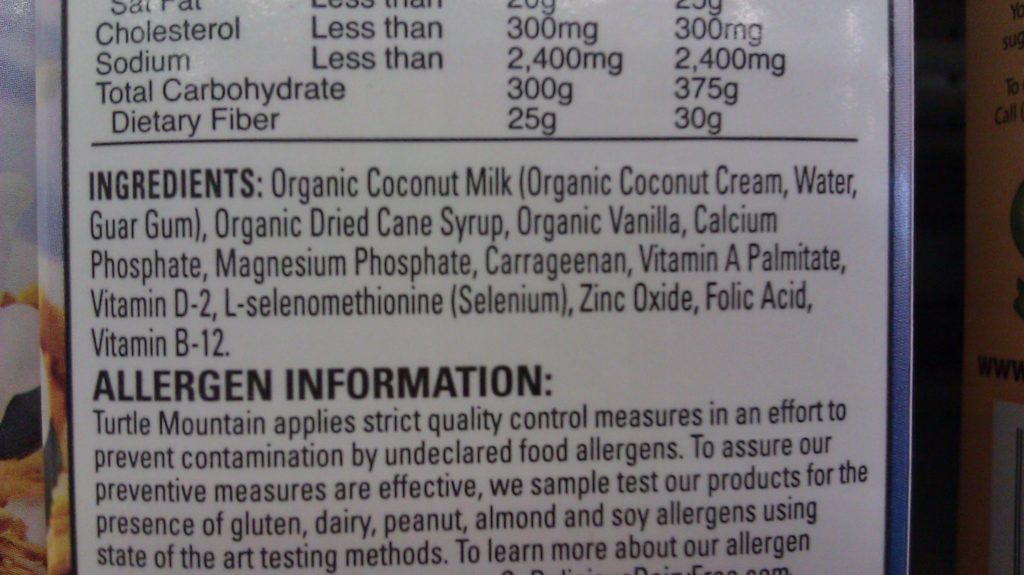 Organic coconut milk and almond milk are common purchases at the health food store by those with dairy allergies. Usually, these people are savvy consumers who know enough nutritionally to avoid soy milk with its endocrine disrupting isoflavones and gastric inflaming phytates. Rice milk is also steadily declining in popularity as it is really not much more than a glass of sugar water nutritionally speaking.
Organic coconut milk and almond milk are common purchases at the health food store by those with dairy allergies. Usually, these people are savvy consumers who know enough nutritionally to avoid soy milk with its endocrine disrupting isoflavones and gastric inflaming phytates. Rice milk is also steadily declining in popularity as it is really not much more than a glass of sugar water nutritionally speaking.
Organic, unsweetened coconut milk and almond milk in cartons seem like great alternatives at first blush, but are they really as “healthy” as people believe?
Let’s take a look at the labels. I was shocked at what I found.
Check out the labels of the three brands I photographed. I checked all the brands, by the way, and they all contained the same dangerous additives I’m about to describe.

First, Vitamin A Palmitate is added, the synthetic version of Vitamin A. I personally avoid synthetic versions of Vitamin A like the plague. Every single multi-vitamin I’ve ever examined contains some form of synthetic A, including the so called “whole foods” multis.
Synthetic vitamins are the chemical mirror images of the real, natural versions. They can cause imbalances over time. Even small amounts of the synthetic fat soluble vitamins like Vitamin A can prove toxic and should be strictly avoided!
The Organic Consumers Association warns that isolated vitamins such as those produced synthetically cannot be recognized or metabolized by the body in the same way as the natural version.

Large doses of natural vitamin A are well tolerated by the body as established by researchers decades ago, however. Traditional diets contain 10 times or more of the RDA of this nutrient with no ill effect. However, synthetic vitamin A is associated with birth defects and bone fractures. It has no benefit in the diet whatsoever.

The second really bad additive in these organic cartons of coconut milk and almond milk is Vitamin D2. Vitamin D2 is a form of the wonder vitamin that you should take great pains to avoid.
In all known cases of Vitamin D toxicity where the dose was intentional, Vitamin D2 was the culprit. By comparison, Vitamin D3 is much less toxic and requires an enormous or even an accidental dose to produce any toxic effect.
Vitamin D2 is manufactured industrially by irradiating yeast. It is dangerous for D2 to be added to any food product particularly if this product would be given to children, where toxicity symptoms would appear at much lower dosages.
None of the store brands of cartoned coconut milk or almond milk were free of these dangerous and synthetic versions of the fat soluble vitamins!
Notice also that carrageenan is present in 2 of the 3 products as well! Dr. Andrew Weil has been telling people to avoid carrageenan since 2002.
Carrageenan is so toxic and inflaming to the human digestive system that this food additive is formally classified by the International Agency for Research on Cancer (part of the World Health Organization) as a potential human carcinogen.
In my view, it would be a mistake to purchase and consume these items. They are in no way health promoting or beneficial, particularly for growing children!
Healthy Alternatives to Coconut Milk and Almond Milk in Cartons
Coconut milk and almond milk should be healthy and they can be if they are produced at home without these dangerous additives. I wrote an in depth post on how to easily make these nondairy beverages yourself. This recipe for wild rice milk is a good option as well.
Believe it or not, even organic coconut milk in BPA free cans would be a better alternative to cartons of coconut milk based on my label inspection!
Check out my video on homemade coconut milk and my article on how to make healthy DIY almond milk, fermented to add probiotics and enzymes to boost immunity and improve digestion.
Sarah, The Healthy Home Economist
Sources
From Seafood to Sunshine: A New Understanding of Vitamin D Safety








I will have to do some investigation on the subject of vitamins and synthetic A being in all brands even brands that are labeled to contain just carotene as a natural A.
Are you saying that the FDA does not allow the muti vitamins to NOT have a synthetic A?
If so why is that?
And are some brands of multi vitamins which are labeled with carotene as the vitamin A source mislabeling?
Please be clear on this as I think it has stirred up a huge confusion for the readers. Especially mothers taking prenatal vitamins.
Coconut and Almond Milk in Cartons Not a Healthy Buy http://t.co/mHG0PQoF RT @billnigh rut-roh… RT @BernArmiento RT @realfoodmedia
Coconut and Almond Milk in Cartons Not a Healthy Buy http://t.co/4HCIsc9X
Coconut and Almond Milk in Cartons Not a Healthy Buy http://t.co/AhNBg2bu , another winner from the Healthy Home Economist.
After reading this article and then hearing from more than one that all multi vitamins had the synthetic A in it, I pulled my Multi Vitamin out of the cabinet to see if it had Vit A Palmitate in it, it did not. It has only Vit A. from Natural Beta Carotene. I take the NOW brand EcoGreen Multi.
Also, though I haven’t checked it out yet, I would be willing to bet that the Life Extensions bands of Multi Vit does not include synthetic anything! This is another good brand that our family buys.
What about the cartons themselves? Do you know what they are lined with? I’ve always been curious about that.
can you emaill mail, [email protected]
Do you have a good source for nuts in bulk? We eat so many soaked and dried nuts and we drink canned coconut milk (the carton stuff is watered down anyway…) and I HAVE been buying unsweetened almond milk. For those who make their own, is it really cheaper?
Nickole
What about a healthier option for almond milk? My husband does not like coconut milk @ all.
I’m sorry to say this, but your statement that ALL of the milk alternatives contain those harmful additives…is FALSE.
I am sitting here, with my SO delicious coconut milk beverage, organic and unsweetened. The ingredients are: organic coconut milk (water, organic coconut cream) carrageenan, guar gum.
NO vitamin A NO vitamin D. They are in fact listed as 0% in the nutritional table.
I am Canadian, so maybe that is the difference? But you should make it clear in your posts where you have looked/live (america, canada, etc) so your readers both new and old ones are reminded that this information is relative to YOUR area. Rather than initially scarring the poop out of them ha!